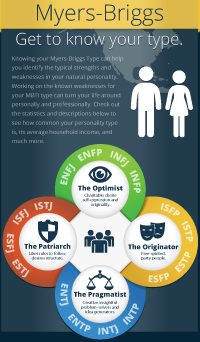Career Tips for ISFP Personality Types (Introverted-Sensing-Feeling-Perceiving)
The Myers-Briggs Type Indicator® (MBTI®) provides useful information considering personality preferences and characteristics to help identify best-fit careers. Isabel Myers and Katharine Briggs used Carl Jung’s theory of psychological type, categorizing people into 16 different personality types. The Myers-Briggs® Test can assist individuals with meaningful personal and professional growth. Using this tool during the career exploration process aids with the selection of a career that is focused on personality preferences. There are five components of the career exploration process, the first being occupation selection, followed by goal setting, gathering information, networking, and finally, decision making. Each personality dichotomy will have a different approach to these steps based on their specific functions: Extraversion versus Introversion, Sensing versus Intuition, Thinking versus Feeling, and Judging versus Perceiving.
ISFP Personality Types (Introverted-Sensing-Feeling-Perceiving) Career Choice.
ISFP types are found to be receptive and tenderhearted. They live their lives by guidelines they have set for themselves instead of abiding by social normality. Dedicated and consistent, ISFP personality types value punctuality and find enjoyment in the realization of the effect they can make in others’ lives. Frequently, ISFP personality types are found in occupations allowing them to care for others, such as veterinary assistants/technicians, nurse’s aids, coaches, and drivers, but are also known to obtain employment in industries where their superior problem-solving capability can be utilized, for example, installation or repair.

Read about The Myers-Briggs® Test ISFP Personality Type Career Tips and other Occupational Information
The most relevant aspect of ISFP-preferred occupations is the ability to work with their hands. Because ISFPs are dexterous, this personality dichotomy finds enjoyment with vocations allowing for a concrete result produced by a product of practical work. Also, this type of person finds pleasure in working with people and animals. Possessing the skill of persuasion, ISFPs can assist others with compromise and also display strength with their ability to adapt to an ever-changing environment. Typically, they do not enjoy environments with a shared workspace or with strict time constraints. As an introvert, an ideal work situation would be quiet, with no disruption. They are not the type of people to force their opinion and values on others, as conflict is a common stressor for ISFPs. When considering a career, structure, independence, and recognition for accomplishments are values that ISFPs find important. While establishing processes and procedures that can be malleable for perfecting workflow are desirable for most people, finding an environment that allows for adaptability and growth is best suited for an ISFP personality type. Additionally, ISFPs should steer clear of occupations that involve having to inform others of displeasing information or those that have environments that consistently engage in debate. The best-suited career choice for this personality type is a work climate with tranquility, cooperation, and compliance. Some occupations which ISFPs have expressed happiness are Bill and Account Collector, Bookkeeping, Accounting, and Auditing Clerks, Cashier, Medical Transcriptionist, Nursing Assistant, Packaging & Filling Machine Operators, Pharmacy Technician, Physical Therapy Aide, Procurement Clerk, and Team Assembler.
ISFP Personality Types Goal Setting and Gathering Information.
The first step in the career exploration process is to set goals. During this process, an ISFP will naturally seize opportunities that others may overlook. Starting with obvious goals will be the first course of action for an ISFP, though having less awareness of long-term goals is common for this personality type. In order to be successful during the goal-setting step of this process, ISFP personality types should create a course of action to achieve their ambition. They should also set goals for not only the immediate but also the distant future. It is in an ISFPs nature to begin gathering information by referring to a career online source prior to speaking with professionals regarding a considered career. Learning firsthand from experts can provide valuable insight needed for making decisions regarding career choices. This intel can provide details regarding the long-term expectation versus the reality of the job. An ISFP must remember not to be overwhelmed when gathering these specifics, or this type of person can fail to recognize the extended benefits of a position. For instance, if too much information is obtained, an ISFP may choose a career based only on a short-term interest such as wage or hours of operation, forgetting their preference for long-term location goals. ISFP personality types regularly rely on facts but are also versatile feelers who take how their decisions will affect others in their lives, such as their family and loved ones.
ISFP Personality Types and Networking.
After goals have been established and an ISFP gathers information, it is important for them to begin making contacts with professionals who can provide valuable insight into the occupation of their choosing. This networking process can be a daunting task for individuals who are naturally introverted. An ISFP generally prefers to contact a limited group of experts or, at times, may not see the value that this step can assist with their career exploration process and fail to connect with others. Choosing not to connect with valuable career specialists and those professionals in their desired field to discuss the ins and outs of the job can result in missed learning opportunities. An effective tool for ISFPs is to begin this networking process by contacting family and friends, who can perhaps introduce them to relevant contacts within their social circles. Having more contacts within your circle when searching for a career can be extremely helpful with job opportunities, referrals, letters of recommendation, and even additional persons to practice the interviewing process with.
In terms of interviewing, ISFP personality types typically come across as cooperative and have little difficulty presenting a comprehensive illustration of specific experiences but may find it challenging to answer debatable questions or make long-term predictions. The easiest way to handle this adversity is to diligently prepare for these types of questions and keep the interview focused on pertinent possessed skills. ISFPs should also take into consideration what personality dichotomy the interviewer may be. A Thinking interviewer may see an ISFP as not being task-oriented. An Intuitive interviewer might be disconcerted if given too many specifics. Understanding others’ potential reactions based on their personality can be a guideline on how to redirect focus in a positive direction. An ISFPs inherent strength in precision, patience, and awareness of others’ feelings are assets that an interviewer will find impressive.

Read about The Myers-Briggs® Test ISFP Personality Type Career Tips and other Occupational Information
ISFP Personality Types and Decision-Making.
For an ISFP, decision-making can be the most difficult part of the career exploration process. Setting a deadline when deciding on a career and having the ability to not stray from that date is vital to the success of the process. This date should be one which was set during the goal-setting phase of the process and should allow enough time for each step in the period proceeding. ISFPs may find that disclosing this “Decision Date” to family and friends can be a helpful way to see it through. Additionally, writing your decision date down in an area that is seen daily can also be helpful. This personality type will tend to use an inner-directed approach, with the consideration of their loved ones as well as for themselves. However, an ISFP may not take into account the plausible impacts of alternative career options before making a decision due to being overly swayed by others’ personal wants or needs. It is important for an ISFP to consider their own desires when making an important career-choice decision and also to create a systemization for considering each option. For example, a simple pros and cons chart can help an ISFP make an informed decision while still having the ability to take others wants into consideration.
For this personality type, it is common to ignore information that causes them distress. When information is ignored, decisions become much more challenging, resulting in an ISFP postponing the last step of this process, the action of making a decision. Because ISFPs live for the moment, it may be difficult for them to look past the immediate future. This personality type is also known to avoid risk-taking. In order to gain successful employment in a career, appropriate compromise to this natural behavior is advised. In doing so, it is important for ISFP personality types to reward themselves for their achievements. Simple pleasures and awards for achieving set goals will validate career exploration process successes and put this personality type on a clear path to execute a further plan of action.
In order to stay focused, an ISFP should not only document their researched findings as well as accomplishments but also keep their networked contacts informed of both. In order for this type to be successful, they should find a balance between their ability to find happiness within themselves while pleasing others close to them. If sole concentration and consideration regarding career choice are placed only on generosity for others, ISFPs will find it difficult to achieve self-satisfaction.
After the final step of the career exploration process has been completed and an occupational decision has been reached, it is common for an ISFP to evaluate the efforts and criticize their actions. The best way to combat this innate behavior is to reinforce intrinsic rewards and continually emphasize value. Beginning the entire career exploration process using the Myers-Briggs Type Indicator® and beginning with goals based on their personality can set a job seeker on a path to finding a career with like-minded colleagues in a rewarding occupation.
Learn More About the MBTI ISFP Personality Type
Explore additional information that delves deeper into the ISFP Personality Type by examining various personality and career-based subjects:
- How the MBTI ISFP Type relates to Innovation
- How the MBTI ISFP Type relates to Project Management
- How the MBTI ISFP Type relates to Emotional Intelligence
- How the MBTI ISFP Type relates to Leadership
- How the MBTI ISFP Type relates to Decision Making
- How the MBTI ISFP Type Deals with Change
- ISFP Personality Type Career Resource
Click on the link below to read more about different MBTI Personality Types
| ISTJ | ISFJ | INFJ | INTJ | ESTP | ESFP | ENFP | ENTP |
| ISTP | ISFP | INFP | INTP | ESTJ | ESFJ | ENFJ | ENTJ |
References
Introduction to Type (Isabel Briggs Myers, 1998, CPP Inc.)
Introduction to Type and Careers (Allen L. Hammer, 2007, CPP Inc.)


